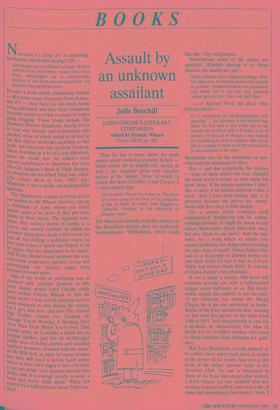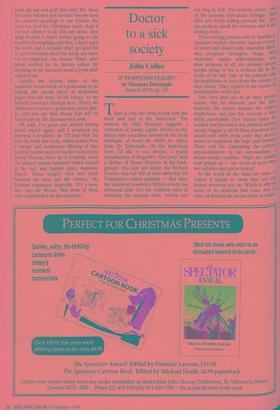BOOKS
Assault by an unknown assailant
Julie Burchill
LORD GNOME'S LITERARY COMPANION edited by Francis Wheen Verso, £18.95, pp. 362 Now here's a thing. It's an anthology, for starters, which says on page 329:
Anthologies are a publisher's delight. Writers don't have to write them, readers don't read them. Anthologies are a characteristic product of the short-attention-span era: the channel-hopping of literature.
It's also a book which consistently bitches —like some rogue firestarter from Fahren- heit 451 — that there are too many books being published, and lists them obsessively by name whenever it has a couple of inches going begging. These books include The Homeless Person's Handbook, Sneaky Tricks to Fool your Friends and Entertaining with Alcohol, none of which sound at all bad to rile. But they're un-books according to this book, not literature but spiritual stocking- fillers. It comes as a bit of a jolt, therefore, When we recall that the editor's most recent contribution to literature has been The Old Salopian's Book of Fluffy Bunnies, or whatever the wretched thing was called. (The Chatto Book of Cats, 1993? Ed.) Whatever, it was a smelly old stocking-filler supreme.
The Soolcworm' column in Private Eye is not written by Mr Wheen, however, but by a collection of types whom you could admire quite a lot more if they put their names to their pieces. The repeated com- plaint that today's world of books is a cowed and craven creature in which no reviewer dares give a book a bad review for fear of not finding a publisher when his OW n turn comes is surely not helped at all by critics who are frightened to be identi- fied. It also doesn't stand up when one con- siders how much more spiteful, vicious and .entertaining the literary pages have become in recent years. And if the world of publishing was as Obsessed with youthful glamour as this book claims, would Lord Gnome really latest picked Francis Wheen to edit his latest work? I may not be handing out too Many bouquets to him during this review, but I give him here and now The Annual Phil Collins Award For Looking As Though You're Wearing A Stocking Over Your Face Even When You're Not. That Plaudit apart, he is neither a stylist nor an original thinker, and like all middle-aged .media men of fading charms and receding hairlines he seems obsessed with the novel- ist Mr Will Self, as when he warns readers that they will need a heroin habit some- where in their back pages if they ever want to get into print: 'Any aspirant novelist who Inaks that it is enough merely to write a book had better think again.' What, not even if it's a brilliant book about fluffy bun- nies? Then he has a moan about the posh papers never reviewing popular fiction — which struck me as slightly odd, seeing as how I am regularly given very sizeable spaces in the Sunday Times in which to review the likes of Collins, J and Cooper, J — and explains that
This is where Private Eye comes in. The liter- ary review page at the back of the magazine is just as likely to notice Jack Higgins or Catherine Cookson as Iris Murdoch or Kingsley And&
Yet when you actually read the reviews in the Bestsellers section, they are uniformly contemptuous: 'Publishing's about trash like this.' Very enlightened.
Nevertheless, some of the pieces are excellent. Whether dishing it to Brian Masters, the murderer's pal —
When Dahmer does disgusting things, Mas- ters takes care to describe them as favourably as possible. 'Dismemberment was unpleasant and messy, but it was the only practical option open to him.' That's all right then!
— or Richard Ford, the Boy's Own bull-merchant — It's a succession of sub-philosophical little speeches ... So infectious is this rubbish that when the boy sees a wee boidy out of the window he credits it with a Fordian crisis of identity. 'It just sat as though it was waiting for something to start to happen that would give it a reason to move or to fly or even look in one direction or the other.'
Bookworm can do the maximum of mis- chief with the minimum of effort.
But — and this is probably the decider — none of these pieces has ever changed my mind about a writer, or even made me think twice. If he attacks someone I don't like, I cheer; if he attacks someone I like, I sneer. And I can't help feeling that it is precisely because the pieces are anony- mous that they carry so little weight.
For a column which considers itself sophisticated, Bookworm can be embar- rassingly juvenile. It might be funny to call Adam Mars-Jones Adam Mars-Bar once, but nine times in one piece? And the mis- takes, for a book which so primly rails against publishers for sloppy proof-reading, are epic; boys, it wasn't Helen Zahavi who said of a biography of Darwin (come on, just think about it!) that it was 'as if Oscar Wilde had written Death Wish'. It was me, of Helen Zahavi's Diny Weekend.
If not a laugh a minute, this book will certainly provide you with a half-hearted snigger every half-hour or so. But Book- worm, despite his conceits, is not the voice of the Ordinary Joe versus the Media Clique; he is far too interested in hacks' Books of the Year choices for that, running no less than five pieces on the topic from 1988 to 1993. And, thoughtlessly at ease for a moment, he characterises The Man In Books Etc as 'a baffled donkey' who turns to these bulletins from Olympus for guid- ance.
But here Bookworm reveals himself to be rather more starry-eyed when it comes to the power of the media than even I, the toast of the ladies' powder room at the Groucho Club. No one is interested in Book of the Year lists except other writers; I don't believe for one moment that any donkey, however baffled, ever read a list of mine and immediately hee-hawed, 'Ooh, I must nip out and grab that one!' No, these lists have become just another way we send the season's greetings to our friends, the ones too cool for Christmas cards. And if I'm not allowed to do this any more, then quite frankly I shan't bother going to the trouble of compiling such lists. I don't need the work, and I certainly don't get paid for it, and I certainly shan't be doing any more for my employer, the Sunday Times, after being scolded by its literary editor for choosing as my favourite novel a book ded- icated to me.
Luckily, the literary editor of this magazine is too much of a gentleman to go poking and prying about in dedication pages that are none of his bizney, so my friend's novel got through here. That's the difference between a gentleman and a play- er, and why my Best Books List will be found only in The Spectator next year.
Oh look, I've gone and started writing about myself again, and I promised my husband I wouldn't. So I'll end with the best bit from this book, which comes from a savage and sumptuous filleting of that fearless frontiersman of media mediocracy, David Thomas. Here he is boasting about the alleged 'sexual chemistry' which existed at his sad, and happily gone, magazine Punch: 'Jokes winged back and forth between the men and the women,' Mr Thomas reminisces tragically. 'It's a won- der,' says the Worm, 'that none of them ever crash-landed on the magazine.'



































































 Previous page
Previous page